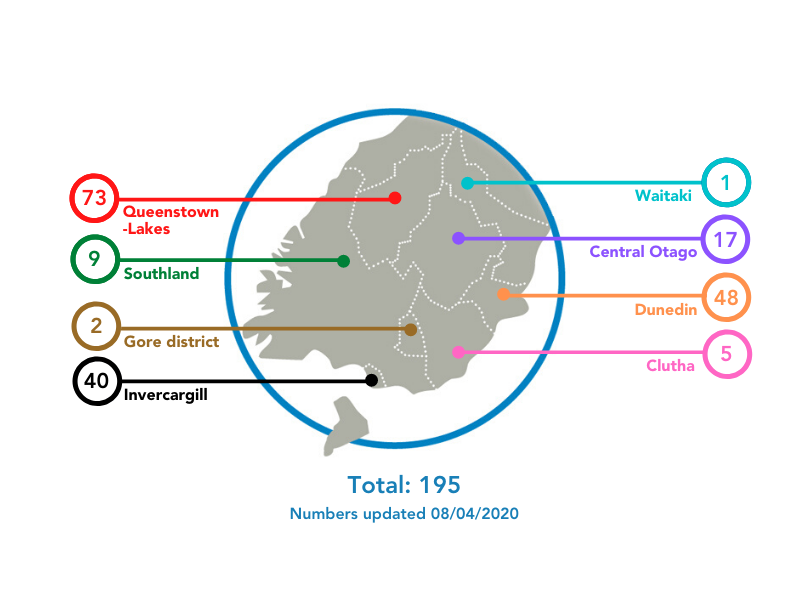Prime Minister Jacinda Ardern says everyday Kiwis are "breaking the chain of transmission", but is warning the fight against Covid-19 will be a marathon and has introduced tough new quarantine measures for people coming to NZ from overseas.
Only 29 new Covid-19 cases were announced today, which was the lowest number of cases since March 23, before the lockdown began, Ardern said.
"We are turning a corner and your commitment means our plan is working.
"But to succeed we need it to keep working."
Removing the restrictions would see New Zealand returning to the "starting line", which was why the Government would continue to enforce the rules and fighting the virus would be a "marathon".
"What New Zealanders have done over the last two weeks is huge."
Director-General of Health Dr Ashley Bloomfield said the 29 cases are comprised of 23 confirmed cases and six probable cases, bringing the total number of cases to 1239.
Meanwhile the Bluff wedding cluster is now the largest Covid-19 cases, with numbers climbing by six to 87, followed by Marist College (84) and the Matamata cluster (64).
There are no additional deaths to report, but there are 14 people in hospital and four people in ICU.
One of those in ICU is in Dunedin Hospital and the Southern District Health Board yesterday said one patient in Dunedin was in a critical condition.
There are now 317 recovered cases – an increase of 35 on yesterday, higher than the number of new cases.
Quarantine of all overseas arrivals
Ardern said from midnight tonight every New Zealander boarding a flight to return home will be required to undergo quarantine or managed isolation in an approved facility for a minimum of 14 days.
"I am also signalling that the requirement for 14 days of quarantine or managed self-isolation in a government-approved facility will be a prerequisite for anyone entering the country in order to keep the virus out."
"Even one person slipping through the cracks and bringing the virus in can see an explosion in cases as we have observed with some of our bigger clusters."
She said ongoing quarantine was a huge task, and it could not have been done "from the beginning".
"A network of up to 18 hotels will be used to implement this approach, of which one to two will be specifically set aside for those under strict quarantine conditions."

- Otago doctor calls for more localised reporting of Covid-19 cases
- Live: Schools won't all reopen straight away
- Exposure by arrest, police in isolation
- ‘Enough is enough’: Police say they will arrest those who repeatedly break rules
It comes as Education Minister Chris Hipkins today warned parents it would be wrong for them to assume that all schools will reopen as soon as the lockdown ends.
"That's not going to happen," he told the Epidemic Response Committee this morning.
Hipkins said parents would need to prepare to have their kids at home for longer than the four-week lockdown period.
"It's going to be a progressive reopening of the system, rather than a big bang all at once."
The same went for tertiary institutions and early childhood centres as well.
Although Hipkins said that at level three there would be more flexibility, it would take a while for most schools to reopen.
New Zealand is just past the halfway point in the four-week lockdown period – however the Government has always maintained that the lockdown can be extended.
Ardern has so far provided no confirmation as to whether level four would be extended.

Fewest cases in South yesterday since day 2 of lockdown
The South yesterday recorded its lowest number of new cases of Covid-19 since day 2 of the lockdown.
And despite the South reaching 195 total cases - 26 more cases than the next hardest-hit region, Waitemata, with 169 — the eight new cases in the South marked just the third time the daily increase was not a double-digit increase in new cases since the Alert Level 4 lockdown restrictions came into effect on March 26.

On day 14, as 50 new cases were recorded nationally, bringing New Zealand’s total to 1210, Prime Minister Jacinda Ardern said she had "cautious optimism" the lockdown was working — and Southern District Health Board chairman Dave Cull yesterday said he shared her view at a local level.
"Southern has had the highest per capita rate of positive cases of any DHB region," Mr Cull said.
"In response Public Health South has conducted an exhaustive contact tracing and testing regime. If that has identified a high proportion of any cases in the community, it augurs well for the region. So, yes, I am cautiously optimistic, too."
Five of yesterday’s new cases were in Queenstown, bringing the Queenstown-Lakes district to 73 cases — 25 more than Dunedin (48), which increased by two cases.
Invercargill remained at 40 cases. Central Otago increased by one case to reach 17. Southland remained at nine cases, Clutha at five, Gore at two and Waitaki at one.
The largest age group affected remained 20 to 29-year-olds, who made up 57 of 195 cases; followed by 50 to 59-year-olds at 40; and 30 to 39-year-olds at 26.
Mr Cull — along with the region’s mayors — yesterday issued a plea to police for checkpoints on southern roads to restrict travel between districts by would-be Easter holiday-makers in the coming days.
"In particular, the implementation of checkpoints on the roads to keep would-be travellers in their own areas and out of the usual destinations, such as Queenstown and Central Otago, would be a significant assistance to us," he said.
ODT and NZ Herald













